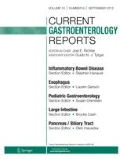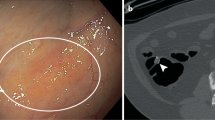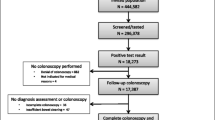Abstract
Screening for colorectal cancer (CRC) reduces CRC mortality; many countries have implemented population-based CRC screening programmes and many more are poised to do so. Whilst several different CRC screening modalities are available, choice will be influenced by cost, available resources (e.g. high-quality colonoscopy) and acceptability of the test by the invited population. For CRC screening, no screening test has so far surpassed the practicality, affordability and effectiveness of tests for the presence of blood in faeces (faecal occult blood tests, FOBt). The results of several large FOBt-based randomised controlled trials provide the best clinical evidence to support their use in population-based CRC screening. This review considers the current options for CRC screening and the future for FOBt.

Similar content being viewed by others
References
Papers of particular interest, published recently, have been highlighted as: • Of importance •• Of major importance
Ferlay J, Soerjomataram I, Ervi M, Dikshit R, Eser S, Mathers C, et al. Cancer incidence and mortality worldwide: IARC CancerBase No. 11 [Internet]. GLOBOCAN 2012 v1.0 Lyon, France: International Agency for Research on Cancer, 2013. Available from: http://globocan.iarc.fr.
Brenner H, Hoffmeister M, Stegmaier C, Brenner G, Altenhofen L, Haug U. Risk of progression of advanced adenomas to colorectal cancer by age and sex: estimates based on 840 149 screening colonoscopies. Gut. 2007;56(11):1585–9.
Winawer SJ, Fletcher RH, Miller L, Godlee F, Stolar MH, Mulrow CD, et al. Colorectal cancer screening: clinical guidelines and rationale. Gastroenterology. 1997;112(2):594–642.
Gupta S, Sussman DA, Doubeni CA, Anderson DS, Day L, Deshpande AR, et al. Challenges and possible solutions to colorectal cancer screening for the underserved. JNCI 2014;106(4):dju032.
Pox CP, Altenhofen L, Brenner H, Theilmeier A, Von Stillfried D, Schmiegel W. Efficacy of a nationwide screening colonoscopy program for colorectal cancer. Gastroenterology. 2012;142(7):1460–7. e2.
European guidelines for quality assurance in colorectal cancer screening and diagnosis. First edition ed. Segnan N, Patnick J, von Karsa L, editors. Luxembourg: Publications Office of the European Union; 2010.
Panteris V, Haringsma J, Kuipers EJ. Colonoscopy perforation rate, mechanisms and outcome: from diagnostic to therapeutic colonoscopy. Endoscopy. 2009;41(11):941–51.
Kaminski MF, Bretthauer M, Zauber AG, Kuipers EJ, Adami HO, van Ballegooijen M, et al. The NordICC Study: rationale and design of a randomized trial on colonoscopy screening for colorectal cancer. Endoscopy. 2012;44(7):695–702.
Elmunzer BJ, Hayward RA, Schoenfeld PS, Saini SD, Deshpande A, Waljee AK. Effect of flexible sigmoidoscopy-based screening on incidence and mortality of colorectal cancer: a systematic review and meta-analysis of randomized controlled trials. PLoS Med. 2012;9(12):e1001352.
Schoen RE, Pinsky PF, Weissfeld JL, Yokochi LA, Church T, Laiyemo AO, et al. Colorectal-cancer incidence and mortality with screening flexible sigmoidoscopy. NEJM. 2012;366(25):2345–57.
Segnan N, Armaroli P, Bonelli L, Risio M, Sciallero S, Zappa M, et al. Once-only sigmoidoscopy in colorectal cancer screening: follow-up findings of the Italian Randomized Controlled Trial–SCORE. JNCI. 2011;103(17):1310–22.
Atkin WS, Edwards R, Kralj-Hans I, Wooldrage K, Hart AR, Northover JM, et al. Once-only flexible sigmoidoscopy screening in prevention of colorectal cancer: a multicentre randomised controlled trial. Lancet. 2010;375(9726):1624–33.
Holme Ø, Løberg M, Kalager M, et al. Effect of flexible sigmoidoscopy screening on colorectal cancer incidence and mortality: a randomized clinical trial. JAMA. 2014;312(6):606–15.
Cappell MS. The pathophysiology, clinical presentation, and diagnosis of colon cancer and adenomatous polyps. Med Clin North Am. 2005;89(1):1–42.
National Cancer Institute. Protocol for the National Cancer Institute Prostate, Lung, Colorectal, Ovarian (PLCO) Cancer Screening Trial. Version 13. March 2006. Available from: http://www.nejm.org/doi/suppl/10.1056/NEJMoa1114635/suppl_file/nejmoa1114635_protocol.pdf. Accessed: 18-11-2014.
Stoop EM, de Haan MC, de Wijkerslooth TR, Bossuyt PM, van Ballegooijen M, Nio CY, et al. Participation and yield of colonoscopy versus non-cathartic CT colonography in population-based screening for colorectal cancer: a randomised controlled trial. Lancet Oncol. 2012;13(1):55–64.
Mandel JS, Bond JH, Church TR, Snover DC, Bradley GM, Schuman LM, et al. Reducing mortality from colorectal cancer by screening for fecal occult blood. Minnesota Colon Cancer Control Study. NEJM. 1993;328(19):1365–71.
Kewenter J, Brevinge H, Engaras B, Haglind E, Ahren C. Results of screening, rescreening, and follow-up in a prospective randomized study for detection of colorectal cancer by fecal occult blood testing. Results for 68,308 subjects. Scand J Gastroenterol. 1994;29(5):468–73.
Hardcastle JD, Chamberlain JO, Robinson MH, Moss SM, Amar SS, Balfour TW, et al. Randomised controlled trial of faecal-occult-blood screening for colorectal cancer. Lancet. 1996;348(9040):1472–7.
Kronborg O, Fenger C, Olsen J, Jorgensen OD, Sondergaard O. Randomised study of screening for colorectal cancer with faecal-occult-blood test. Lancet. 1996;348(9040):1467–71.
Hewitson P, Glasziou P, Watson E, Towler B, Irwig L. Cochrane systematic review of colorectal cancer screening using the fecal occult blood test (hemoccult): an update. Am J Gastroenterol. 2008;103(6):1541–9.
Greegor DH. Occult blood testing for detection of asymptomatic colon cancer. Cancer. 1971;28(1):131–4.
Greegor DH. Diagnosis of large-bowel cancer in the asymptomatic patient. JAMA. 1967;201:943–5.
van Rossum LG, van Rijn AF, Laheij RJ, van Oijen MG, Fockens P, van Krieken HH, et al. Random comparison of guaiac and immunochemical fecal occult blood tests for colorectal cancer in a screening population. Gastroenterology. 2008;135(1):82–90.
Kuipers EJ, Rosch T, Bretthauer M. Colorectal cancer screening—optimizing current strategies and new directions. Nat Rev Clin Oncol. 2013;10(3):130–42.
Duffy MJ, Lamerz R, Haglund C, Nicolini A, Kalousová M, Holubec L, et al. Tumor markers in colorectal cancer, gastric cancer and gastrointestinal stromal cancers: European group on tumor markers 2014 guidelines update. Int J Cancer. 2014;134(11):2513–22. This paper provides a recommendation from an international expert panel that an immunochemical-based faecal occult blood test be used for screening asymptomatic subjects for colorectal cancer.
Young GP, Fraser CG, Halloran SP, Cole S. Guaiac based faecal occult blood testing for colorectal cancer screening: an obsolete strategy? Gut. 2012;61(7):959–60.
Allison JE, Fraser CG, Halloran SP, Young GP. Population screening for colorectal cancer means getting FIT. The past, present, and future of colorectal cancer screening using FIT. Gut and Liver. 2014;8:117–30.
Rabeneck L, Rumble RB, Thompson F, Mills M, Oleschuk C, Whibley A, et al. Fecal immunochemical tests compared with guaiac fecal occult blood tests for population-based colorectal cancer screening. Can J Gastroenterol. 2012;26(3):131–47. The Cancer Care Ontario’s Fecal Immunochemical Tests (FIT) Guidelines Expert Panel reviewed the evidence for FIT and concluded that FIT performance is superior to guaiac-based faecal occult blood tests in terms of uptake of screening and the detection of colorectal cancer and advanced adenoma.
Songster CL, Barrows GH, Jarrett DD. Immunochemical detection of fecal occult blood–the fecal smear punch-disc test: a new non-invasive screening test for colorectal cancer. Cancer. 1980;45(5 Suppl):1099–102.
Hol L, Wilschut JA, van Ballegooijen M, van Vuuren AJ, van der Valk H, Reijerink JC, et al. Screening for colorectal cancer: random comparison of guaiac and immunochemical faecal occult blood testing at different cut-off levels. Br J Cancer. 2009;100(7):1103–10.
von Karsa L, Patnick J, Segnan N, Atkin W, Halloran S, Lansdorp-Vogelaar I, et al. European guidelines for quality assurance in colorectal cancer screening and diagnosis: overview and introduction to the full supplement publication. Endoscopy. 2013;45(1):51–9.
Halloran SP, Launoy G, Zappa M. European guidelines for quality assurance in colorectal cancer screening and diagnosis. First Edition Faecal occult blood testing. Endoscopy. 2012;44(S 03):SE65–87. A special edition of Endoscopy includes guidelines on faecal occult blood testing for colorectal cancer from the European Colorectal Cancer Screening Guidelines Working Group. The detailed description of guaiac-based tests and faecal immunochemical tests (FIT), and a review of the evidence for DNA and other related markers, highlights the superiority of quantitative FIT in terms of uptake, laboratory processes and disease detection and the opportunities FIT afford to adjust cut-offs for positivity to manage local colonoscopy resource.
Steele RJC, McDonald PJ, Digby J, Brownlee LA, Strachan JA, Libby G, et al. Clinical outcomes using a faecal immunochemical test for haemoglobin as a first-line test in a national programme constrained by colonoscopy capacity. U Eur Gastroenterol J. 2013;1(3):198–205.
van Roon AHC, Goede SL, van Ballegooijen M, van Vuuren AJ, Looman CWN, Biermann K, et al. Random comparison of repeated faecal immunochemical testing at different intervals for population-based colorectal cancer screening. Gut. 2013;62(3):409–15.
Zorzi M, Fedato C, Grazzini G, Sassoli de’ Bianchi P, Naldoni C, Pendenza M, et al. Screening for colorectal cancer in Italy, 2010 survey. Epidemiol Prev. 2012;36(6 Suppl 1):55–77. Lo screening colorettale in Italia, survey 2010.
Zorzi M, Fedeli U, Schievano E, Bovo E, Guzzinati S, Baracco S, et al. Impact on colorectal cancer mortality of screening programmes based on the faecal immunochemical test. Gut 2014. Epub 2014/09/01. This recent paper reports a significant reduction in CRC mortality in FIT-based screening programmes in Italy.
van Roon AH, Wilschut JA, Hol L, van Ballegooijen M, Reijerink JC, t Mannetje H, et al. Diagnostic yield improves with collection of 2 samples in fecal immunochemical test screening without affecting attendance. Clin Gastroenterol Hepatol. 2011;9(4):333–9.
Oort FA, van Turenhout ST, Coupe VM, van der Hulst RW, Wesdorp EI, Terhaar sive Droste JS, et al. Double sampling of a faecal immunochemical test is not superior to single sampling for detection of colorectal neoplasia: a colonoscopy controlled prospective cohort study. BMC Cancer. 2011;11:434.
Young GP, Sinatra MA, St John DJ. Influence of delay in stool sampling on fecal occult blood test sensitivity. Clin Chem. 1996;42(7):1107–8.
Faure H, Exbrayat C, Winckel P, Bolla M. Moisture content of hemoccult slides influences test sensitivity. Eur J Gastroenterol Hepatol. 2003;15(10):1111–4.
Hunter JP, Saratzis A, Froggatt P, Harmston C. Effect of season and ambient temperature on outcome of guaiac-based faecal occult blood tests performed for colorectal cancer screening. Colorectal Dis. 2012;14(9):1084–9.
Seaman HE, Butler P, Snowball JM, Halloran SP. PWE-020: do seasonal trends in positivity exist with the guaiac-based faecal occult blood test? Gut. 2013;62 Suppl 1:A137–8.
Grazzini G, Ventura L, Zappa M, Ciatto S, Confortini M, Rapi S, et al. Influence of seasonal variations in ambient temperatures on performance of immunochemical faecal occult blood test for colorectal cancer screening: observational study from the Florence district. Gut. 2010;59(11):1511–5.
Guittet L, Guillaume E, Levillain R, Beley P, Tichet J, Lantieri O, et al. Analytical comparison of three quantitative immunochemical fecal occult blood tests for colorectal cancer screening. Cancer Epidemiol Biomarkers Prev. 2011;20(7):1492–501.
van Roon AHC, Hol L, van Vuuren AJ, Francke J, Ouwendijk M, Heijens A, et al. Are fecal immunochemical test characteristics influenced by sample return time? A population-based colorectal cancer screening trial. Am J Gastroenterol. 2012;107(1):99–107.
Chausserie S, Levillain R, Puvinel J, Ferrand O, Ruiz A, Raginel T, et al. Seasonal variations do not affect the superiority of fecal immunochemical tests over guaiac tests for colorectal cancer screening. Int J Cancer 2014.
Steele RJC, McClements P, Watling C, Libby G, Weller D, Brewster DH, et al. Interval cancers in a FOBT-based colorectal cancer population screening programme: implications for stage, gender and tumour site. Gut. 2012;61(4):576–81.
Zorzi M, Fedato C, Grazzini G, Stocco FC, Banovich F, Bortoli A, et al. High sensitivity of five colorectal screening programmes with faecal immunochemical test in the Veneto Region. Italy Gut. 2011;60(7):944–9.
Sadik R, Abrahamsson H, Stotzer PO. Gender differences in gut transit shown with a newly developed radiological procedure. Scand J Gastroenterol. 2003;38(1):36–42.
Digby J, Fraser CG, Carey FA, McDonald PJ, Strachan JA, Diament RH, et al. Faecal haemoglobin concentration is related to severity of colorectal neoplasia. J Clin Pathol. 2013;66(5):415–9.
Stegeman I, de Wijkerslooth TR, Stoop EM, van Leerdam ME, Dekker E, van Ballegooijen M, et al. Combining risk factors with faecal immunochemical test outcome for selecting CRC screenees for colonoscopy. Gut. 2014;63(3):466–71. This Dutch group developed a risk prediction model for use in CRC screening, incorporating the FIT result with other known risk factors for CRC and demonstrated that combining risk stratification with the FIT result increased the accuracy of FIT screening.
Moran A, Radley S, Neoptolemos J, Jones AF, Asquith P. Detection of colorectal cancer by faecal α1-Antitrypsin. Ann Clin Biochem. 1993;30(1):28–33.
Nakayama T, Yasuoka H, Kishino T, Ohguchi H, Takada M. ELISA for occult faecal albumin. Lancet. 1987;329(8546):1368–9.
Miyoshi H, Ohshiba S, Asada S, Hirata I, Uchida K. Immunological determination of fecal hemoglobin and transferrin levels: a comparison with other fecal occult blood tests. Am J Gastroenterol. 1992;87(1):67–73.
Dubrow R, Kim CS, Eldred AK. Fecal lysozyme: an unreliable marker for colorectal cancer. Am J Gastroenterol. 1992;87(5):617–21.
Tonus C, Sellinger M, Koss K, Neupert G. Faecal pyruvate kinase isoenzyme type M2 for colorectal cancer screening: a meta-analysis. World J Gastroenterol. 2012;18(30):4004–11.
Imperiale TF, Ransohoff DF, Itzkowitz SH, Turnbull BA, Ross ME. Fecal DNA versus fecal occult blood for colorectal-cancer screening in an average-risk population. NEJM. 2004;351(26):2704–14.
Ahlquist DA, Sargent DJ, Loprinzi CL, Levin TR, Rex DK, Ahnen DJ, et al. Stool DNA and occult blood testing for screen detection of colorectal neoplasia. Ann Intern Med. 2008;149(7):441. –50, W81.
Imperiale TF, Ransohoff DF, Itzkowitz SH, Levin TR, Lavin P, Lidgard GP, et al. Multitarget stool DNA testing for colorectal-cancer screening. NEJM. 2014;370:1287–97. Imperiale et al. compared the performance of a multi-target stool DNA test plus FIT with FIT alone for the detection of CRC and adenomas in average-risk subjects. The multi-target test demonstrated superior sensitivity but was less specific than FIT alone; the practicalities and expense of the multi-target stool test currently preclude consideration for use in routine population-based CRC screening programmes.
Senore C, Segnan N. Multitarget stool DNA testing for colorectal-cancer screening. NEJM. 2014;371(2):185–6.
The Wall Street Journal. FDA approves DNA test for colon cancer. Dow Jones & Company; 2014; Available from: http://online.wsj.com/articles/fda-approves-dna-test-for-colon-cancer-1407798806. Accessed: 2014-09-19.
Toyooka S, Toyooka KO, Harada K, Miyajima K, Makarla P, Sathyanarayana UG, et al. Aberrant methylation of the CDH13 (H-cadherin) promoter region in colorectal cancers and adenomas. Cancer Res. 2002;62(12):3382–6.
Toyota M, Shen L, Ohe-Toyota M, Hamilton SR, Sinicrope FA, Issa JP. Aberrant methylation of the cyclooxygenase 2 CpG island in colorectal tumors. Cancer Res. 2000;60(15):4044–8.
Ebert MP, Mooney SH, Tonnes-Priddy L, Lograsso J, Hoffmann J, Chen J, et al. Hypermethylation of the TPEF/HPP1 gene in primary and metastatic colorectal cancers. Neoplasia (New York, NY). 2005;7(8):771–8.
Lofton-Day C, Model F, Devos T, Tetzner R, Distler J, Schuster M, et al. DNA methylation biomarkers for blood-based colorectal cancer screening. Clin Chem. 2008;54(2):414–23.
de Vos T, Tetzner R, Model F, Weiss G, Schuster M, Distler J, et al. Circulating methylated SEPT9 DNA in plasma is a biomarker for colorectal cancer. Clin Chem. 2009;55(7):1337–46.
Church TR, Wandell M, Lofton-Day C, Mongin SJ, Burger M, Payne SR, et al. Prospective evaluation of methylated SEPT9 in plasma for detection of asymptomatic colorectal cancer. Gut. 2014;63(2):317–25.
Steele RJC, Kostourou I, McClements P, Watling C, Libby G, Weller D, et al. Effect of gender, age and deprivation on key performance indicators in a FOBT-based colorectal screening programme. J Med Screen. 2010;17(2):68–74.
Moss SM, Campbell C, Melia J, Coleman D, Smith S, Parker R, et al. Performance measures in three rounds of the English bowel cancer screening pilot. Gut. 2012;61(1):101–7.
von Wagner C, Baio G, Raine R, Snowball J, Morris S, Atkin W, et al. Inequalities in participation in an organized national colorectal cancer screening programme: results from the first 2.6 million invitations in England. Int J Epidemiol. 2011;40(3):712–8.
Quintero E, Castells A, Bujanda L, Cubiella J, Salas D, Lanas Á, et al. Colonoscopy versus fecal immunochemical testing in colorectal-cancer screening. NEJM. 2012;366(8):697–706.
Hol L, van Leerdam ME, van Ballegooijen M, van Vuuren AJ, van Dekken H, Reijerink JC, et al. Screening for colorectal cancer: randomised trial comparing guaiac-based and immunochemical faecal occult blood testing and flexible sigmoidoscopy. Gut. 2010;59(1):62–8.
Federici A, Giorgi Rossi P, Borgia P, Bartolozzi F, Farchi S, Gausticchi G. The immunochemical faecal occult blood test leads to higher compliance than the guaiac for colorectal cancer screening programmes: a cluster randomized controlled trial. J Med Screen. 2005;12(2):83–8.
Hoffman RM, Steel S, Yee EF, Massie L, Schrader RM, Murata GH. Colorectal cancer screening adherence is higher with fecal immunochemical tests than guaiac-based fecal occult blood tests: a randomized, controlled trial. Prev Med. 2010;50(5–6):297–9.
Vart G, Banzi R, Minozzi S. Comparing participation rates between immunochemical and guaiac faecal occult blood tests: a systematic review and meta-analysis. Prev Med. 2012;55(2):87–92. This systematic review of the published literature comparing participation in colorectal cancer screening programmes using a FIT with programmes using a guaiac-based faecal occult blood test reported significantly higher participation with FIT.
Senore C, Ederle A, Benazzato L, Arrigoni A, Silvani M, Fantin A, et al. Offering people a choice for colorectal cancer screening. Gut. 2013;62(5):735–40.
Whyte S, Chilcott J, Halloran S. Re-appraisal of the options for colorectal cancer screening in England. Colorectal Dis 2012.
Compliance with Ethics Guidelines
Conflict of Interest
Sally C Benton, Helen E Seaman, and Stephen P Halloran declare that they have no conflicts of interest.
Human and Animal Rights and Informed Consent
This article does not contain any studies with human or animal subjects performed by any of the authors.
Author information
Authors and Affiliations
Corresponding author
Additional information
This article is part of the Topical Collection on GI Oncology
Rights and permissions
About this article
Cite this article
Benton, S.C., Seaman, H.E. & Halloran, S.P. Faecal Occult Blood Testing for Colorectal Cancer Screening: the Past or the Future. Curr Gastroenterol Rep 17, 7 (2015). https://doi.org/10.1007/s11894-015-0428-2
Published:
DOI: https://doi.org/10.1007/s11894-015-0428-2




